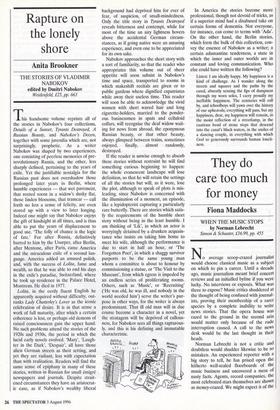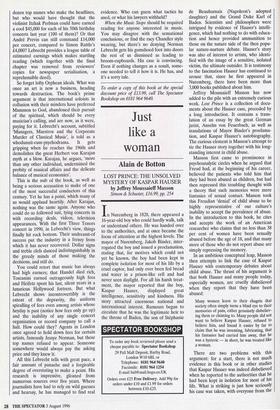They do care too much for money
Fiona Maddocks
WHEN THE MUSIC STOPS by Norman Lebrecht Simon & Schuster, £16.99, pp. 455
Na average scoop-crazed journalist would choose classical music as a subject on which to pin a career. Until a decade ago, music journalism meant brief concert reviews and an initialled byline if you were lucky. No interviews or exposes. What was there to expose? Music critics shuddered at the thought of being confused with journal- ists, proving their membership of a rarer species by a complete inability to write news stories. That the opera house was razed to the ground in the second aria would matter only because of the rude interruption caused. A call to the news desk would be the last thought in their heads.
Norman Lebrecht is not a critic and doubtless would shudder likewise to be so mistaken. An experienced reporter with a big story to tell, he has prised open the hitherto well-sealed floorboards of the music business and uncovered a mess of nasty facts. Agents, record companies, the most celebrated stars themselves are shown as money-crazed. We might expect it of the dozen top names who make the headlines, but who would have thought that the violinist Itzhak Perlman could have earned a cool $45,000 for each of his 50th birthday concerts last year (100 of them)? Or that Andre Previn can still command £14,000 per concert, compared to Simon Rattle's £4,000? Lebrecht provides a league table of estimated earnings which makes startling reading (which together with the final chapter was removed from reviewers' copies for newspaper serialisation, a reprehensible deed).
So forget lofty Orphean ideals. What was once an art is now a business, heading towards destruction. The book's prime argument is that international soloists in collusion with their minders have preferred Mammon to God, abandoned their pursuit of the spiritual, which should be every musician's calling, and are now, as it were, paying for it. Lebrecht's account, subtitled 'Managers, Maestros and the Corporate Murder of Classical Music', is told as a whodunnit-cum-psychodrama. It gets gripping when he reaches the 1960s and demolishes the great Herbert von Karajan myth at a blow. Karajan, he argues, 'more than any other individual, undermined the probity of musical affairs and the delicate balance of musical economics'.
This is the nub of the book, as well as being a serious accusation to make of one of the most successful conductors of this century. Yet he has a point, which many of us would applaud heartily. After Karajan, nothing was the same again. Anyone who could do so followed suit, tying concerts in with recording deals, videos, television appearances. With the first Three Tenors concert in 1990, in Lebrecht's view, things finally hit rock bottom. Their undreamt-of success put the industry in a frenzy from which it has never recovered. Dollar signs and treble clefs danced indistinguishably in the greedy minds of those making the decisions, and still do.
You could retort that music has always had high earners; that Handel died rich, Toscanini earned outrageously high fees and Heifetz spent his last, silent years in a luxurious Hollywood fortress. But what Lebrecht shows incontrovertibly is the extent of the depravity, the uniform spiralling of fees even among artists whose heyday is past (notice how fees only go up) and the inability of any single concert organisation or record company to call a halt. How could they? Agents in London once agreed to hold down fees for certain artists, famously Jessye Norman, but these top names refused to appear. Someone somewhere would always pay the asking price and they knew it.
All this Lebrecht tells with great pace, a fair amount of panache and a forgivable degree of overstating to make a point. His research is impressive, gleaned from numerous sources over five years. Where journalists have had to rely on wild guesses and hearsay, he has managed to find real evidence. Who can guess what tactics he used, or what his lawyers withheld?
When the Music Stops should be required reading for anyone interested in music. You may disagree with the sensational conclusions, or find the racy Chandler style wearing, but there's no denying Norman Lebrecht gets his gumshoed foot into doors the rest of us dismissed as leading to broom-cupboards. His case is convincing. Even if nothing changes as a result, some- one needed to tell it how it is. He has, and it's a sorry tale.
To order a copy of this book at the special discount price of £13.99, call The Spectator Bookshop on 0181 964 9640.



















































 Previous page
Previous page